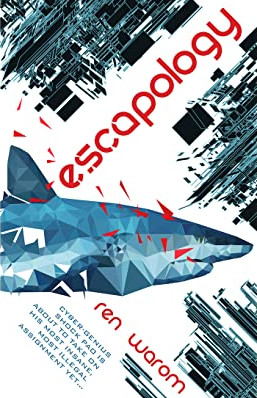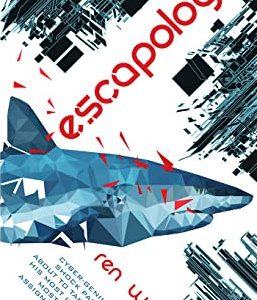Escapology by Ren Warom (Titan Books, 2016)
If I reveal that the characters in Escapology, Ren Warom’s first novel, have names such as Amiga, Shock, Twist and Deuce then some of you will immediately deduce a great deal more about the book. You’ll intuit that this is an everyday story of hacker folk. You may guess that these down-at-heel types live in a world of improbably lurid crime bosses. Or that the events take place amidst a mulched-together mish-mash of far Eastern cultures. You’ll almost certainly be able to predict that the plot revolves around an improbable heist and semi-mystical technology.

Escapology crams all the familiar cyberpunk set-dressing between its covers with a completeness that feels almost like compulsion. From an unlikely virtual reality realm in which hacking requires solving Crystal Maze style puzzles to neon-splashed, rain-sluiced streets filled with ramen bars – all the unmistakable elements are formed with cookie cutter neatness and tidily stacked. Whether this is taken as an opportunity to revel in nostalgia or as a tedious rehashing of a worn-out future will, I suppose, depend upon the reader. I found the whole thing a slightly dispiriting experience. It’s not that Escapology doesn’t have nice moments – there’s a car chase escape in the final quarter that is a well-handled action sequence and some of the dialogue was sharp enough to make me laugh out loud. However, the whole thing is so firmly fixed on familiar rails that I frequently struggled to find any motivation to return to the book.
Escapology is too long. There’s a subplot about giant paddle-wheel-driven moving islands whose purpose I still haven’t fathomed. Other events drag on at extraordinary length and forward momentum is thrown away as viewpoint characters pause to muse on history and sociology or indulge in amateur psychological analysis of their own motivations. There is a leaner, more enjoyable, 300 page novel struggling to free itself from the 450 pages presented here and an editor should have found it.
Cyberpunk has always had a problematic relationship with “The East” – smothering it with love even as it alienates us from the object of its desire. Even at its best the subgenre has tended to use Eastern cultural references as lazy exoticism. During cyberpunk’s first-flowering the appropriation of Eastern cultural elements at least served a purpose – unsettling Western readers’ comfortable assumptions about what the future should look like. Even then, though, it was often a problematic technique. Four decades on, this seam has been worked to exhaustion and the descent into over familiarity and cliché has undermined any usefulness in the tropes.
It’s never clear to me what purpose the Korean, Chinese and Japanese cultural paraphernalia serves in Escapology or why this range of cultures are mushed together except, perhaps, that it provides the characters something interesting to eat (it feels as though there’s a lot of food in the novel.) Some of the characters are identified as Asian but everyone speaks and thinks in the same sardonic, Californian-inflected internal monologue that is another trope of soft-boiled cyberpunk. In mannerism, voice and thought the main characters are, too often, indistinguishable and all cultural diversity feels skin deep.
Ironically, had Warom set her story amongst the chippies and curry houses of the Midlands (where her biography says she lives) instead of an imagined Occident then Escapology’s cyber-noir stylings might have felt stranger, fresher and more interesting.
One curious element of Escapology is the treatment of the central character Shock’s (a hacker, obviously) transgender status. Warom is clearly sympathetic but the denouement – in which Shock is forced to accept a part of him (an avatar in the form of an octopus) that is apparently innately and resolutely feminine despite his painful rejection of that identity – is uncomfortable. I believe Warom is trying to give the character a sense of peace after a (literally, in places) tortuous character arc – but the best one can say about it is that it feels confusing.
Some readers will revel in Escapology – glad to back in this kind of place with these kinds of people. I can see that appeal. But this familiarity also edges the book too close to pastiche and is its greatest weakness. There were moments when I did enjoy the book. And there were moments which I genuinely enjoyed. But I’ve been down these neon-lit streets and surfed these virtual landscapes too often. I won’t be returning for the sequel, Virology, which is already on sale.
A slightly shorter version of this review originally appeared in The BSFA Review (No. 10, Spring 2020).

Leave a Reply